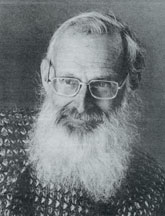“Father of Shaw Island”
Frederick Eugene Ellis Sr. ’38

Frederick Eugene Ellis Sr. '38, February 5, 2010, at home on Shaw Island, Washington, from congestive heart failure.
A passionate conservationist whose lifelong endeavors preserved thousands of acres in the San Juan archipelago of Washington state, Fred was known as the “Father of Shaw Island.” His reverence for planet earth was fueled early in his life by celestial observations, which he made through a homemade telescope.
His interest in astronomy led him to Reed, where he designed a major in mathematics, astronomy, and philosophy. (“Education came alive when I got to Reed.”) He commuted as a day-dodger, and spent his evenings studying the Orion Nebula. “Social life? I'd say maybe that was the most negative part of doing all this night work,” he told Nancy Stewart Green ’50 in—an oral history interview. More than once, his maternal aunt said: “Fred, why don't you get your head out of the sky and start dating some nice young woman?”
Fred drew inspiration from classes with F.L. Griffin [mathematics 1911-56] and Edward O. Sisson [philosophy 1911-43], but especially from those with L.E. Griffin [biology 1920-45]. “He, along with my parents, really got my feeling of a sense of stewardship for the planet, rather than exploiting it and seeing it as a consumer entity; that this is something to be nurtured and taken care of.” While at Reed, He went with his father, Robert H. Ellis Sr., to Shaw Island. The Orcas Lime Company on Shaw had gone “belly up,” according to Fred, and sold their land “dirt-cheap” to his father. Thereafter, Fred enjoyed vacations on the island, and after graduating, he taught mathematics, Latin, and shop nearby at Anacortes High School.
Fred went to the Harvard College Observatory as the Pickering Memorial Assistant, then volunteered for war service as a medic with the British 18th Army Dagger Division medical unit in Burma-an experience that left him with a permanent leg injury and an aversion to war. (He and his wife, Marilyn S. Segal, whom he married in 1953, later helped Vietnam War draftees from the U.S. gain passage into Vancouver, British Columbia.)
After the war, Fred earned a PhD from Harvard in philosophy and history, and taught at the University of New Hampshire, Tufts College, the University of Minnesota (where he met Marilyn), Harvard, the University of Illinois, the University of British Columbia, and Western Washington University. “I loved getting around and meeting various visiting faculty people.” Throughout his career, he kept a connection to Shaw Island, and he and Marilyn settled there to raise a family and manage a cattle ranch.
Fred was a founding member of the San Juan Preservation Trust and led a crusade against commercial development on the islands. The campaign was successful in preserving land on Blakely, Cypress, Lopez, Orcas, and San Juan islands. Fred and Marilyn donated more than 1,400 acres of their land on Shaw and Lopez islands—woodlands, wetlands, meadows, and coastline—to the University of Washington Friday Harbor Laboratories, to be kept in its natural state as a scientific preserve. In 2002, the university dedicated the Frederick & Marilyn Ellis Biological Preserve on Shaw. The Washington Environmental Council recognized the couple as environmental heroes. “Shaw Island is exactly as it was when Captain Vancouver sailed through here,” Fred said. “To be able to look out over this without it being messed up by condos and garbage is worth everything.”
Fred served on the boards of the Puget Sound Water Quality Authority, the Oregon Historical Society, and the Washington Hemlock Society. He is doubtless the only individual to have been named both Fellow of the American Association for the Advancement of Science and Skagit County Cattleman of the Year. He was also a musician and a sailor.
Fred's brothers, Henry D. Ellis ’34 and Robert H. Ellis Jr. ’37, graduated from Reed, and his parents established the Robert H. and Blanche Day Ellis Memorial Fund to endow a faculty position at Reed—a fund further endowed by Fred and his siblings. Fred and Marilyn also established the Frederick E. and Marilyn Segal Ellis Scholarship at Reed. In 2009, Fred received the Foster-Scholz distinguished service award. “Reed gave me a real sense of environmental responsibility, of being involved, not being just a bystander,” Fred stated. “Getting in where the action is. That the earth is a pretty rare place. There aren't very many of them, if any, and you better take care of it.” Survivors include five daughters, a son, eight grandchildren, and five great-grandchildren. Marilyn died in 2000.
Fred was featured in the profile "Land Preserver," by L.D. Kirshenbaum ’84, in Reed magazine.
Fred was a tireless conservationist, reported the Seattle Times.
Appeared in Reed magazine: September 2010
comments powered by Disqus


![Photo of Prof. Marvin Levich [philosophy 1953–94]](https://www.reed.edu/reed-magazine/in-memoriam/assets/images/2022/LTL-levich1.jpg)
![Photo of President Paul E. Bragdon [1971–88]](https://www.reed.edu/reed-magazine/in-memoriam/assets/images/2020/Bragdon.jpg)
![Photo of Prof. Edward Barton Segel [history 1973–2011]](https://www.reed.edu/reed-magazine/in-memoriam/assets/images/2020/Segel.jpg)








































































